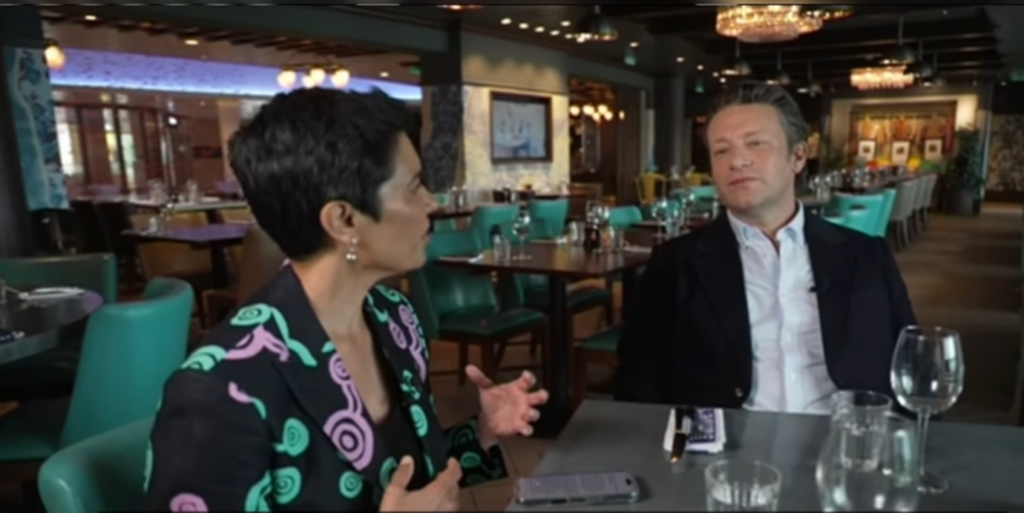British celebrity chef Jamie Oliver has spoken about the steep cultural learning curve he has undergone since he apologised and withdrew a children’s book he wrote that negatively stereotyped a young First Nations character.
In an exclusive interview with journalist Narelda Jacobs on 10 News First, Oliver said he has taken the time to understand how the book’s narrative is offensive to Aboriginal and Torres Strait Islander people for its negative stereotyping.
The book, Billy and the Epic Escape, features a character named Ruby, an Aboriginal girl from Alice Springs in foster care, who is stolen by the book’s villain because of her magical connection with nature.
Oliver and the book’s publisher, Penguin Random House UK, did not consult with any First Nations people or organisations before publishing it.
When criticism of the book emerged, Oliver and the publisher apologised for publishing it and for causing offence to First Nations people.
“I am devastated to have caused offence and apologise wholeheartedly,” the statement from Oliver said. “It was never my intention to misinterpret this deeply painful issue. Together with my publishers we have decided to withdraw the book from sale.”
Penguin Random House said its publishing standards “fell short” and it must “learn from that and take decisive action”.
“With that in mind, we have agreed with our author, Jamie Oliver, that we will be withdrawing the book from sale.”
Speaking to Jacobs on 10 News First, Oliver said he had not been aware of the experiences of Aboriginal and Torres Strait Islander people since colonisation, including the history of the Stolen Generations and the disproportionate number of First Nations children in state care today.
“It wasn’t designed for any reason…obviously my knowledge of the stolen nation wasn’t there,” he said. “[If it had been] I wouldn’t have written it quite like that…It really wasn’t – in my mind – connected with any knowledge of the terrible things that have happened in Australia’s history.”
Oliver said he had wanted to make Ruby a First Nations character because he’s always felt there is a lot to learn from First Nations cultures.
“I wanted to make her First Nations, because I have travelled around the world and spent time with First Nations around the world. They’ve always stolen my heart,” he said.
“I’ve always felt like there’s so many things in the history of First Nations that we can learn from today about how we grow, how we eat, how we treat the environment, how we treat each other.”
On Instagram, Jacobs said that she had accepted an invitation from Oliver months ago to help judge his Food Hero Awards.
“When I discovered the subplot of the character Ruby in his second children’s book “Billy and the Epic Escape”, I immediately let his team know how that narrative causes harm,” she wrote.
“I explained to the team how my father was stolen from his parents and how extended members of my family are among the disproportionate number of First Nations children currently in the state care system.”
Oliver has now undergone cultural awareness training with Mundanara Bayles, the Managing Director and co-founder of the BlackCard.
“I’m a massive believer that when in life you get things wrong, you can run away from it and just put your head under the soil and just pretend it didn’t happen, but I genuinely believe in this book, I genuinely believe in its intention and I’m going to take a moment to learn and then see what happens,” Oliver said.
“I’m going to learn, I’m going to reflect and my intention would be to do something special out of this.
“It’s been very painful this whole debacle. So I go home tonight having learnt some stuff and hopefully we’re going to do something quite special from this moment of reflection.”
When asked by Jacobs if he was able to understand the harm caused by the narrative and negative stereotypes in the book. Oliver said he did.
“I understand it was offensive, and that’s why it was even more painful to me, because that was never the intention,” he said.
“I didn’t see them [the negative stereotpyes]. So I’ve had to learn about that…I never would have put those things together, and of course, I never would have seen them as stereotypes, but that’s why we pulled it. So let’s pull it. Let’s take a beat. Let’s reflect.”
The Yoorrook Justice Commission has invited Oliver to engage with them to learn more about First Nations history and truth-telling.
“Yoorrook has invited Jamie Oliver to engage with the truth-telling Commission and meet with First Peoples as part of a learning and healing process,” Yoorrook Justice Commission’s deputy chair Sue-Anne Hunter said in a statement.
“Too often we see people who mean well cause harm or offence because they don’t know the full story of our shared history in Australia.
“The publication of Billy and the Epic Escape shows why truth-telling is so important – to learn and understand history from First Peoples’ perspective.
“We hope this can be the start of a positive process that also helps foster greater understanding among everyday Australians.”

